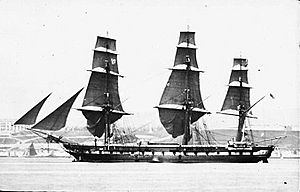HMS Newcastle (1860) facts for kids

Newcastle
|
|
Quick facts for kids History |
|
|---|---|
| Name | HMS Newcastle |
| Namesake | Newcastle upon Tyne |
| Builder | Deptford Dockyard |
| Laid down | 6 December 1858 |
| Launched | 16 October 1860 |
| Completed | September 1874 |
| Decommissioned | 1888 |
| Fate | Sold for breaking up 1929 |
| General characteristics | |
| Class and type | Bristol-class frigate |
| Displacement | 4,020 long tons (4,080 t) |
| Tons burthen | 3035 |
| Length | 250 ft (76.2 m) |
| Beam | 52 ft (15.8 m) |
| Draught | 21 ft (6.4 m) |
| Installed power | 2,354 ihp (1,755 kW) |
| Propulsion | 1 shaft, 1 Steam engine |
| Speed | 12 knots (22 km/h; 14 mph) |
| Complement | 550-600 |
| Armament |
|
HMS Newcastle was a large wooden warship that served in the Royal Navy, the navy of the United Kingdom. It was known as a screw frigate, which means it used both sails and a steam engine with a propeller (screw) to move through the water. This ship was the fifth Royal Navy vessel to be named after the city of Newcastle upon Tyne.
Contents
Meet HMS Newcastle: A Powerful Frigate
HMS Newcastle was a type of warship called a frigate. Frigates were important ships used for many different tasks. They could protect other ships, explore new places, and even fight in battles. The Newcastle was built mostly from wood, which was common for ships of its time.
Building a Mighty Ship
The construction of HMS Newcastle began a long time ago. It was laid down, meaning its keel (the backbone of the ship) was put in place, on December 6, 1858. The ship was built at Deptford Dockyard, a famous shipbuilding place in England.
After two years of hard work, the ship was launched into the water on October 16, 1860. It took several more years to fully complete the ship and get it ready for service. HMS Newcastle was finally finished in September 1874.
Life at Sea: Service and Role
Once completed, HMS Newcastle was ready for its duties. It was officially put into service, or commissioned, to join the Royal Navy fleet. A large crew was needed to operate such a big ship. Between 550 and 600 sailors and officers lived and worked aboard the Newcastle.
The ship served for many years, protecting British interests around the world. It was an important part of the Royal Navy during the Victorian era. In 1888, after years of service, HMS Newcastle was decommissioned, meaning it was taken out of active duty.
Power and Speed of the Frigate
HMS Newcastle was a large ship for its time. It was about 250 feet (76 meters) long, which is longer than two basketball courts! It was also quite wide, measuring about 52 feet (15.8 meters) across. The ship weighed about 4,020 long tons (4,085 metric tons).
To move, it had one steam engine that powered a single propeller shaft. This engine gave the ship about 2,354 horsepower. With its engine, HMS Newcastle could reach a speed of about 12 knots (22 kilometers per hour). This was a good speed for a warship of that period.
What Was Its Job?
As a warship, HMS Newcastle carried many guns. Its main purpose was to be a powerful fighting vessel. It was armed with a mix of different cannons:
- Thirty 8-inch (20 cm) muzzle-loading smoothbore guns. These were large cannons that fired heavy cannonballs.
- Twenty 32-pounder muzzle-loading smoothbore guns. These were smaller but still powerful cannons.
- One 68-pounder muzzle-loading smoothbore gun. This was the largest gun on the ship.
These guns were loaded from the front (muzzle-loading) and had smooth insides (smoothbore), meaning they fired round cannonballs. They were used to defend the ship and attack enemy vessels.
The End of Its Journey
After serving the Royal Navy for many years, HMS Newcastle was eventually sold. In 1929, the ship was sold for "breaking up." This means it was taken apart, and its materials, like wood and metal, were reused or recycled. This was a common end for old warships that were no longer needed.

